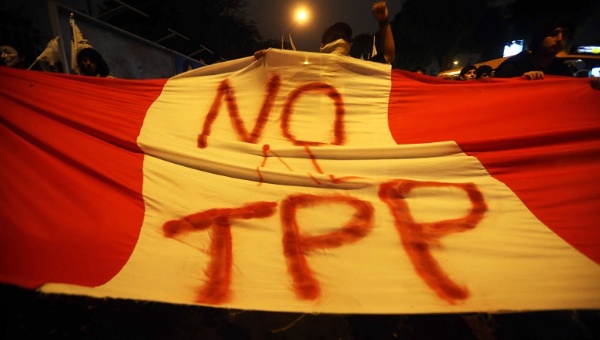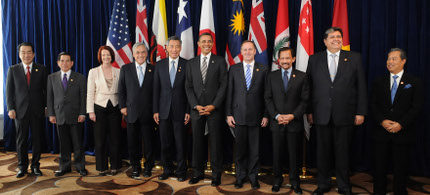The TPP: A Corporate Bill of Rights
TRADE, 8 Feb 2016
One common definition of insanity is doing the same thing over again and expecting a different result.
3 Feb 2016 – Governments from around the world are gathering in New Zealand on Thursday [4 Feb] to sign the Trans-Pacific Partnership, the TPP. People around the world are mobilizing to make sure that the agreement, even if signed, does not get ratified.
Why? It’s just another in a long line of trade deals that are aimed at growing our economies by increasing trade between our countries, right? At least that’s what we’re told.
What we aren’t told by our governments is that these so-called trade deals are really not very much about trade at all. They are international corporate constitutions, aimed at limiting the ability of our governments to control transnational corporate behavior: an international Corporate Bill of Rights.
https://twitter.com/fqxjv/status/692101489150468096/photo/1?ref_src=twsrc^tfw
These deals weaken democracy, increase income inequality, endanger our public services, give corporations more rights than the citizenry, further endanger our already stressed environment, and kill jobs. They sound like they should be of concern only to manufacturing industries, since they are called “trade deals,” so a union like ours (the Canadian Labor Union), mainly public sector, should not be concerned. However, the modern trade deal is also about trade in services – which is what public services are – and these agreements create pressure to privatize public services. These deals are about lowering wages and cutting jobs, which affects the tax base which should support a vibrant public service. These deals are about preventing new public services, so no growth in the sector.
Here’s an interesting fact: most of the governments that want to sign on to the TPP seem to have no real idea how their country’s economy and social systems will be affected. Freer trade has been an article of faith for decades, but there have been few government studies of the concrete, measurable impacts of all the deals that have been signed, and little forecasting of the effects of signing such a massive new agreement as the TPP. If a government wants to sign on to the TPP, shouldn’t they first have to prove there is a demonstrable benefit from doing so?
Promises that these deals will be good for all of us are little more than lies. NAFTA is one of the biggest of these trade deals. It’s an agreement between Canada, the U.S., and Mexico, that has been in place for years.
Since NAFTA was signed in 1994, Canada has lost over 550,000 manufacturing jobs. The U.S. has lost over 1 million manufacturing jobs. Mexico has seen a drastic decline in working conditions and wages. Wages in all three countries have stagnated. Income inequality has increased. Environmental measures by governments have been successfully challenged by corporations. We haven’t seen a significant new social program here in Canada since we signed on to this deal.
#TPP Will Cost Canada 58,000 Jobs, Increase Inequality: Study https://t.co/c9El0pnnhv #NoTPP #NoWayTPPA #StopTPP #TPPWorseThanWeThought
— OWS TradeJustice (@OWSTradeJustice) January 23, 2016
Were there any winners from NAFTA? The biggest corporations in Canada, the ones that had pushed hard for the deal, all saw their profits increase. At the same time the number of people these corporations employed went down.
These are facts, available for everyone to see. Unfortunately, these facts are seldom discussed by our governments. They don’t fit the narrative about how positive these deals supposedly are.
Here’s another interesting fact: these mega deals are always, always, pushed by the largest corporations. There has never been a union demonstration demanding a trade deal, never a people’s assembly requesting one, never a popular movement agitating for one.
Sometimes small and medium sized businesses think they will benefit, but that doesn’t happen. Our own government has done a study concluding that 99 percent of Canadian businesses have not participated in international trade and most are not equipped to do so.
Granted, the TPP is not NAFTA. But it’s very similar in content and intention. And one common definition of insanity is doing the same thing over again and expecting a different result.
https://twitter.com/PCGTW/status/686306271645925376/photo/1?ref_src=twsrc^tfw
Tufts University in the U.S. did an actual study of the likely effects of the TPP. They used modeling based on the United Nations Global Policy Model. The result was sobering – economic losses for the bigger economies, and insignificant growth for the smaller economies, along with a net loss of 650,000 jobs throughout the TPP countries. Labor’s share of the national income will decline throughout the TPP, and income inequality will therefore rise even further.
For this, we are asked to give up democratic control over our economies, the right to make decisions about our environment, the right to regulate corporate behavior. That is a huge price to pay for, at absolute best, a negligible return.
The TPP will not increase the number of jobs, or wages, or provide any real benefit to the peoples of the signing countries.
Here’s what it will do.
It will give corporations the right to challenge laws and regulations of our governments. They would have more right to challenge our governments than we do as citizens. And if the challenges are successful, our governments will have to pay out billions of dollars to these companies.
https://twitter.com/8extremes/status/692584109995008000/photo/1?ref_src=twsrc^tfw
A ban on fracking, a ban on poisonous chemicals for lawn care, refusal to allow a huge quarry on a scenic coastline – all these decisions, and dozens more, have been challenged under this provision in NAFTA. We taxpayers have paid out big dollars as a result. This flagrant abuse of every democratic principle ever articulated, this absolute priority of corporate profit over people’s rights, is called Investor/State or ISDS. It’s a monstrosity, and it’s in the TPP.
The TPP has a provision that no government in the future could safely develop a new publicly run social program. It’s called the negative list, and it says that if you don’t list something now as exempt from the TPP, you can never protect it in the future. How a government can list a program it hasn’t even thought of yet, has never been explained.
The TPP would have a provision that governments can freely decide to privatize their public services, but once they make that decision they can never reconsider. It’s called the ratchet effect. Governments can only move one way, toward privatization, even if the decision to privatize was a dreadful mistake.
The TPP would increase corporate patent rights, so our drugs will be more expensive, forever more.
Some government leaders have boasted about the wonderful labor rights in the TPP. More empty promises. The labor rights sections are almost entirely made up of nice statements about what governments should aspire to, very little about what they must do.
Environmental protection? Very minimal. The words “climate change” are not even mentioned. And while there are some modest provisions around environmental controls, they would be eclipsed by the Investor State Dispute Settlement rights of corporations to challenge government controls of any kind.
The TPP would severely limit the right of governments to use public spending on roads or hospitals or schools as a way to build the local economy. Foreign bidders would have to be given equal right to bid on government contracts, so local public money would be used to bolster the profit of an off-shore corporation, instead of to develop local businesses, or create local jobs, because those foreign businesses can bring their own workers with them.
But the most damning description of the real content of the TPP is probably this: it is thousands of pages long, and there is nothing in those thousands of pages that gives governments, or workers, or the public at large, any new rights. Every single page is about limiting the right of governments to control corporate behavior, in one way or another, or about giving corporations more rights than they have now.
One government official said that the TPP had to be negotiated in secret because if people knew what was in it, they wouldn’t stand for it.
Well, now we know.
_____________________________________
Larry Brown is the National Sec-Treasure of the Candian Labor Union.
Go to Original – telesurtv.net
DISCLAIMER: The statements, views and opinions expressed in pieces republished here are solely those of the authors and do not necessarily represent those of TMS. In accordance with title 17 U.S.C. section 107, this material is distributed without profit to those who have expressed a prior interest in receiving the included information for research and educational purposes. TMS has no affiliation whatsoever with the originator of this article nor is TMS endorsed or sponsored by the originator. “GO TO ORIGINAL” links are provided as a convenience to our readers and allow for verification of authenticity. However, as originating pages are often updated by their originating host sites, the versions posted may not match the versions our readers view when clicking the “GO TO ORIGINAL” links. This site contains copyrighted material the use of which has not always been specifically authorized by the copyright owner. We are making such material available in our efforts to advance understanding of environmental, political, human rights, economic, democracy, scientific, and social justice issues, etc. We believe this constitutes a ‘fair use’ of any such copyrighted material as provided for in section 107 of the US Copyright Law. In accordance with Title 17 U.S.C. Section 107, the material on this site is distributed without profit to those who have expressed a prior interest in receiving the included information for research and educational purposes. For more information go to: http://www.law.cornell.edu/uscode/17/107.shtml. If you wish to use copyrighted material from this site for purposes of your own that go beyond ‘fair use’, you must obtain permission from the copyright owner.

